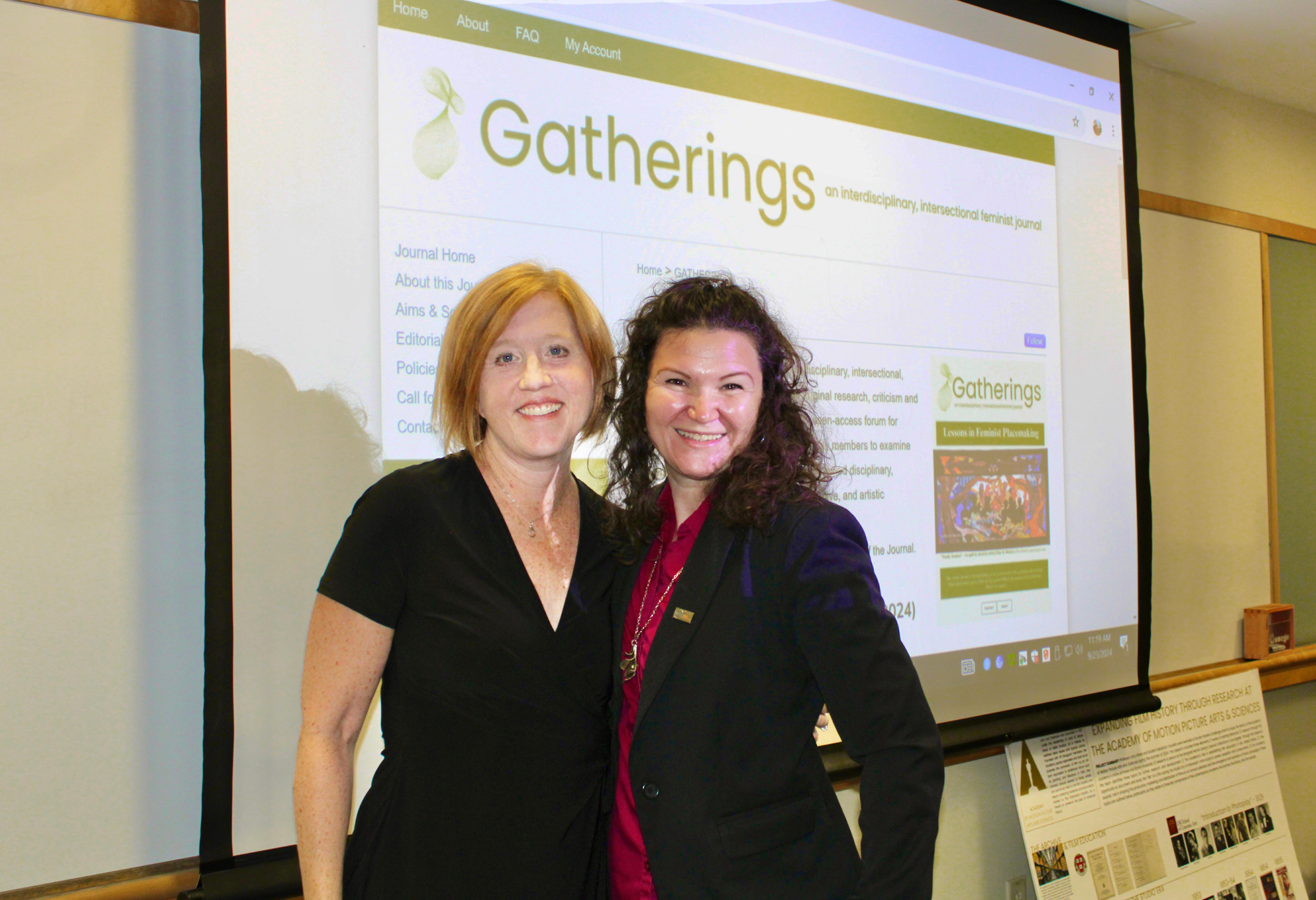Amy Shore of cinema and screen studies and Roberta Hurtado of English and Latino and Latin American studies pose in front of the website for "Gatherings."
Oswego faculty members Amy Shore, of cinema and screen studies, and Roberta (Rosie) Hurtado, of English and creative writing and the director of the Latino and Latin American studies program, are part of a new online feminist journal including scholars from around Upstate New York and beyond.
Shore serves as a managing editor and Hurtado as an editorial board member for the journal, titled “Gatherings: An Interdisciplinary, Intersectional Feminist Journal.” Housed at St. John Fisher University in the Rochester area, the journal aims to bring a diverse group of feminist scholars together across Upstate New York, the nation and the world.
Shore said she was brought on after colleagues at St. John Fisher and Le Moyne College approached her with the idea.
“The reason I joined was because I really related to all of those elements of the mission,” said Shore. “I was attracted [to the idea] because they were interested in engaging with being a feminist journal.That has a political aspect to it, and I think that it’s important now, maybe more than ever, to be very clear with your political commitments.”
After Shore came on, she and the other managing editors asked Hurtado if she would be involved.
“We actively recruited Rosie to join the board because she’s an internationally regarded scholar in her subject areas, [and] she brings depth and breadth to the journal,” said Shore.
Hurtado not only serves on the journal’s editorial board but also contributed to its first issue with a piece about feminist placemaking.
“[Placemaking] is a methodology. It’s a way of being self-reflective, of being aware of what my limitations are, my arrogances,” said Hurtado. “Where does my ego stop me? Where does the arrogance and ego of others stop them? How do I meet people where they’re at but not make excuses so they don’t have to move forward?”
Hurtado realizes it is a challenging topic for writers and readers alike.
“These are hard things to do. Everyone is perfectly imperfect, so how do we give space for each other to be in these moments of coming to consciousness, as [scholar] Gloria Anzaldúa describes?” Hurtado explained. “Everyone is always coming to consciousness at every moment, so how do we make space for that?”
Origin story
The journal was inspired by the region's significance to the feminist movement, including the first women’s rights convention held in Seneca Falls in 1848.
“Seneca Falls is just down the street, and the Seneca Falls Sentiments were written there,” said Hurtado. “If you go you can see where it was written, you can see the Women’s Hall of Fame, so the idea of there not being a feminist collective based in this area is kind of bizarre.”
And while Upstate New York’s feminist roots were an inspiration to many, both Shore and Hurtado recognize the lack of diverse perspectives from the movement's conception. With Gatherings, they hope to promote intersectionality and include women from various backgrounds.
“Within the feminist movement in the United States there is a lot of tension,” Hurtado said, noting that traditional conversations on women’s rights were “almost exclusively talking about white middle-class women who are heterosexual. Different communities have different needs, and many of the white feminist voices said ‘your needs aren’t primary. Your needs are secondary.’”
Collaborative effort
Shore said one of her favorite parts about this experience is the collaborative nature of the project, in more ways than one. The journal is not what one would expect traditionally, as they will be taking submissions of poetry, visual art, journalism and research all together.
“It’s going to be really interesting to put them all in dialogue in one space,” said Shore.
Shore also said the board hopes to expand to include scholars from outside Upstate New York. While the initial editorial board involved institutions from Central and Western York, including other SUNY schools, St. John Fisher, Le Moyne College, Syracuse University, University of Rochester, Rochester Institute of Technology (RIT), Ithaca College, and Cornell University, “We are now starting to add scholars elsewhere in the country in order to move our commitment beyond just where our origins are.”
The journal's second issue, which Shore is co-editing with a graduate student at Georgetown University and a professor in journalism at Metropolitan University in Toronto, will address Palestine and campus-based movements. It will “offer a transnational feminist perspective on solidarity,” said Shore.
Shore says this collaborative effort is a great representation of the journal’s core mission.
“When we think about intersectional feminism, we’re thinking about people from very different positions coming into relationship with one another, as well as thinking about how different things intersect upon us as individuals,” said Shore. “Embodying that is hard work, and to me, that’s a really deep kind of collaboration.”
Shore hopes the journal will encourage people to engage with feminist topics beyond the classroom and continue the work toward better understanding each other’s experiences.
“If we really want to advance feminism, it can’t be something that we just talk about in college,” said Shore.
Those who would like to view the journal can do so at https://fisherpub.sjf.edu/gatherings/.




